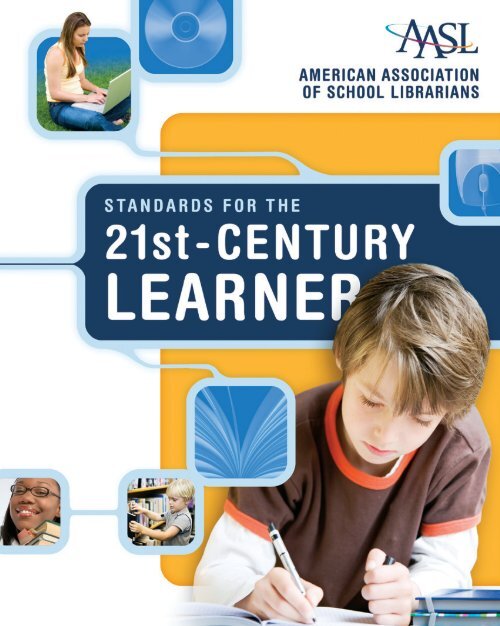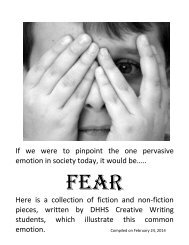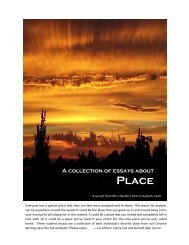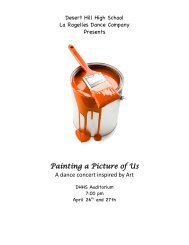AASL Learning Standards
Create successful ePaper yourself
Turn your PDF publications into a flip-book with our unique Google optimized e-Paper software.
Reading is a window<br />
to the world.<br />
Reading is a foundational skill for learning,<br />
personal growth, and enjoyment. The<br />
degree to which students can read and<br />
understand text in all formats (e.g., picture,<br />
video, print) and all contexts is a key<br />
indicator of success in school and in life.<br />
As a lifelong learning skill, reading goes<br />
beyond decoding and comprehension<br />
to interpretation and<br />
development of new<br />
understandings.<br />
Inquiry provides a<br />
framework for learning.<br />
To become independent learners, students<br />
must gain not only the skills but also the<br />
disposition to use those skills, along with an<br />
understanding of their own responsibilities<br />
and self-assessment strategies. Combined,<br />
these four elements build a learner who<br />
can thrive in a complex information<br />
environment.<br />
Ethical behavior in the use<br />
of information must be taught.<br />
In this increasingly global world of<br />
information, students must be taught to<br />
seek diverse perspectives, gather and use<br />
information ethically, and use social tools<br />
responsibly and safely.<br />
Technology skills are crucial<br />
for future employment needs.<br />
Today’s students need to develop<br />
information skills that will enable<br />
them to use technology as an<br />
important tool for learning,<br />
both now and in the future.<br />
Equitable access is<br />
a key component<br />
for education.<br />
All children deserve<br />
equitable access to<br />
books and reading, to<br />
information, and to<br />
information technology<br />
in an environment that<br />
is safe and conducive<br />
to learning.
The definition of information literacy<br />
has become more complex as resources and<br />
technologies have changed.<br />
Information literacy has progressed from the simple<br />
defi nition of using reference resources to fi nd<br />
information. Multiple literacies, including digital,<br />
visual, textual, and technological, have now joined<br />
information literacy as crucial skills for this century.<br />
The continuing expansion of information<br />
demands that all individuals acquire<br />
the thinking skills that will enable<br />
them to learn on their own.<br />
Th e amount of information available to our<br />
learners necessitates that each individual acquire<br />
the skills to select, evaluate, and use information<br />
appropriately and eff ectively.<br />
<strong>Learning</strong> has a social context.<br />
<strong>Learning</strong> is enhanced by opportunities to share<br />
and learn with others. Students need to develop<br />
skills in sharing knowledge and learning with<br />
others, both in face-to-face situations and<br />
through technology.<br />
School libraries are essential to<br />
the development of learning skills.<br />
School libraries provide equitable physical<br />
and intellectual access to the resources and<br />
tools required for learning in a warm, stimulating,<br />
and safe environment. School librarians collaborate<br />
with others to provide<br />
instruction, learning<br />
strategies, and practice<br />
in using the essential<br />
learning skills needed<br />
in the 21st century.<br />
LEARNERS USE SKILLS,<br />
RESOURCES, & TOOLS TO:<br />
1<br />
2<br />
3<br />
4<br />
Inquire, think<br />
critically, and gain<br />
knowledge.<br />
Draw conclusions,<br />
make informed<br />
decisions, apply<br />
knowledge to new<br />
situations, and create<br />
new knowledge.<br />
Share knowledge<br />
and participate<br />
ethically and<br />
productively as<br />
members of our<br />
democratic society.<br />
Pursue personal<br />
and aesthetic<br />
growth.
LEARNERS USE SKILLS, RESOURCES, & TOOLS TO:<br />
1<br />
1.1 Skills<br />
1.1.1 Follow an inquirybased<br />
process in<br />
seeking knowledge in<br />
curricular subjects,<br />
and make the realworld<br />
connection for<br />
using this process in<br />
own life.<br />
1.1.2 Use prior and<br />
background knowledge<br />
as context for new<br />
learning.<br />
1.1.3 Develop and refi ne a<br />
range of questions to<br />
frame the search for<br />
new understanding.<br />
1.1.4 Find, evaluate, and<br />
select appropriate<br />
sources to answer<br />
questions.<br />
1.1.5 Evaluate information<br />
found in selected<br />
sources on the basis<br />
of accuracy, validity,<br />
appropriateness for<br />
needs, importance,<br />
and social and<br />
cultural context.<br />
1.1.6 Read, view, and<br />
listen for information<br />
presented in any<br />
format (e.g., textual,<br />
visual, media, digital)<br />
in order to make<br />
inferences and<br />
gather meaning.<br />
Inquire, think critically,<br />
and gain knowledge.<br />
1.1.7 Make sense of<br />
information gathered<br />
from diverse sources<br />
by identifying<br />
misconceptions,<br />
main and supporting<br />
ideas, confl icting<br />
information, and point<br />
of view or bias.<br />
1.1.8 Demonstrate mastery<br />
of technology tools for<br />
accessing information<br />
and pursuing inquiry.<br />
1.1.9 Collaborate with others<br />
to broaden and deepen<br />
understanding.<br />
1.2 Dispositions<br />
in Action<br />
1.2.1 Display initiative<br />
and engagement by<br />
posing questions<br />
and investigating the<br />
answers beyond the<br />
collection of<br />
superfi cial facts.<br />
1.2.2 Demonstrate<br />
confi dence and selfdirection<br />
by making<br />
independent choices<br />
in the selection<br />
of resources and<br />
information.<br />
1.2.3 Demonstrate creativity<br />
by using multiple<br />
resources and formats.<br />
1.2.4 Maintain a critical<br />
stance by questioning<br />
the validity and<br />
accuracy of all<br />
information.<br />
1.2.5 Demonstrate<br />
adaptability by<br />
changing the inquiry<br />
focus, questions,<br />
resources, or strategies<br />
when necessary to<br />
achieve success.<br />
1.2.6 Display emotional<br />
resilience by persisting<br />
in information<br />
searching despite<br />
challenges.<br />
1.2.7 Display persistence by<br />
continuing to pursue<br />
information to gain a<br />
broad perspective.<br />
1.3 Responsibilities<br />
1.3.1 Respect copyright/<br />
intellectual property<br />
rights of creators<br />
and producers.<br />
1.3.2 Seek divergent<br />
perspectives during<br />
information gathering<br />
and assessment.<br />
1.3.3 Follow ethical and legal<br />
guidelines in gathering<br />
and using information.<br />
1.3.4 Contribute to the<br />
exchange of ideas<br />
within the learning<br />
community.<br />
1.3.5 Use information<br />
technology responsibly.<br />
1.4 Self-Assessment<br />
Strategies<br />
1.4.1 Monitor own<br />
information-seeking<br />
processes for<br />
eff ectiveness and<br />
progress, and adapt<br />
as necessary.<br />
1.4.2 Use interaction<br />
with and feedback<br />
from teachers and<br />
peers to guide own<br />
inquiry process.<br />
1.4.3 Monitor gathered<br />
information, and assess<br />
for gaps or weaknesses.<br />
1.4.4 Seek appropriate help<br />
when it is needed.
LEARNERS USE SKILLS, RESOURCES, & TOOLS TO:<br />
2<br />
2.1 Skills<br />
2.1.1 Continue an inquirybased<br />
research process<br />
by applying criticalthinking<br />
skills (analysis,<br />
synthesis, evaluation,<br />
organization) to<br />
information and<br />
knowledge in order<br />
to construct new<br />
understandings, draw<br />
conclusions, and create<br />
new knowledge.<br />
2.1.2 Organize knowledge<br />
so that it is useful.<br />
2.1.3 Use strategies to<br />
draw conclusions<br />
from information and<br />
apply knowledge to<br />
curricular areas, realworld<br />
situations, and<br />
further investigations.<br />
2.1.4 Use technology and<br />
other information tools<br />
to analyze and organize<br />
information.<br />
2.1.5 Collaborate with<br />
others to exchange<br />
ideas, develop new<br />
understandings, make<br />
decisions, and solve<br />
problems.<br />
Draw conclusions, make<br />
informed decisions, apply knowledge to<br />
new situations, and create new knowledge.<br />
2.1.6 Use the writing<br />
process, media and<br />
visual literacy, and<br />
technology skills<br />
to create products<br />
that express new<br />
understandings.<br />
2.2 Dispositions<br />
in Action<br />
2.2.1 Demonstrate<br />
fl exibility in the<br />
use of resources by<br />
adapting information<br />
strategies to each<br />
specifi c resource and<br />
by seeking additional<br />
resources when clear<br />
conclusions cannot<br />
be drawn.<br />
2.2.2 Use both divergent<br />
and convergent<br />
thinking to formulate<br />
alternative conclusions<br />
and test them against<br />
the evidence.<br />
2.2.3 Employ a critical<br />
stance in drawing<br />
conclusions by<br />
demonstrating that the<br />
pattern of evidence<br />
leads to a decision or<br />
conclusion.<br />
2.2.4 Demonstrate personal<br />
productivity by<br />
completing products<br />
to express learning.<br />
2.3 Responsibilities<br />
2.3.1 Connect<br />
understanding to<br />
the real world.<br />
2.3.2 Consider diverse and<br />
global perspectives in<br />
drawing conclusions.<br />
2.3.3 Use valid information<br />
and reasoned<br />
conclusions to make<br />
ethical decisions.<br />
2.4 Self-Assessment<br />
Strategies<br />
2.4.1 Determine how to act<br />
on information (accept,<br />
reject, modify).<br />
2.4.2 Refl ect on systematic<br />
process, and assess<br />
for completeness of<br />
investigation.<br />
2.4.3 Recognize new<br />
knowledge and<br />
understanding.<br />
2.4.4 Develop directions for<br />
future investigations.
LEARNERS USE SKILLS, RESOURCES, & TOOLS TO:<br />
3<br />
3.1 Skills<br />
3.1.1 Conclude an inquirybased<br />
research<br />
process by sharing<br />
new understandings<br />
and refl ecting on the<br />
learning.<br />
3.1.2 Participate and<br />
collaborate as<br />
members of a social<br />
and intellectual<br />
network of<br />
learners.<br />
Share knowledge and<br />
participate ethically and productively<br />
as members of our democratic society.<br />
3.1.3 Use writing and<br />
speaking skills to<br />
communicate new<br />
understandings<br />
eff ectively.<br />
3.1.4 Use technology and<br />
other information<br />
tools to organize and<br />
display knowledge and<br />
understanding in ways<br />
that others can view,<br />
use, and assess.<br />
3.1.5 Connect learning to<br />
community issues.<br />
3.1.6 Use information and<br />
technology ethically<br />
and responsibly.<br />
3.2 Dispositions<br />
in Action<br />
3.2.1 Demonstrate<br />
leadership and<br />
confi dence by<br />
presenting ideas<br />
to others in both<br />
formal and informal<br />
situations.<br />
3.2.2 Show social<br />
responsibility by<br />
participating actively<br />
with others in learning<br />
situations and by<br />
contributing questions<br />
and ideas during<br />
group discussions.<br />
3.2.3 Demonstrate<br />
teamwork by working<br />
productively with<br />
others.<br />
3.3 Responsibilities<br />
3.3.1 Solicit and respect<br />
diverse perspectives<br />
while searching<br />
for information,<br />
collaborating<br />
with others, and<br />
participating as<br />
a member of the<br />
community.<br />
3.3.2 Respect the diff ering<br />
interests and<br />
experiences of others,<br />
and seek a variety<br />
of viewpoints.<br />
3.3.3 Use knowledge and<br />
information skills<br />
and dispositions<br />
to engage in public<br />
conversation and<br />
debate around issues<br />
of common concern.<br />
3.3.4 Create products that<br />
apply to authentic,<br />
real-world contexts.<br />
3.3.5 Contribute to the<br />
exchange of ideas<br />
within and beyond the<br />
learning community.<br />
3.3.6 Use information<br />
and knowledge in<br />
the service of<br />
democratic values.<br />
3.3.7 Respect the principles<br />
of intellectual freedom.<br />
3.4 Self-Assessment<br />
Strategies<br />
3.4.1 Assess the processes<br />
by which learning was<br />
achieved in order to<br />
revise strategies and<br />
learn more eff ectively<br />
in the future.<br />
3.4.2 Assess the quality and<br />
eff ectiveness of the<br />
learning product.<br />
3.4.3 Assess own ability<br />
to work with others<br />
in a group setting<br />
by evaluating varied<br />
roles, leadership,<br />
and demonstrations<br />
of respect for other<br />
viewpoints.
LEARNERS USE SKILLS, RESOURCES, & TOOLS TO:<br />
4<br />
4.1 Skills<br />
4.1.1 Read, view, and listen<br />
for pleasure and<br />
personal growth.<br />
4.1.2 Read widely and<br />
fl uently to make<br />
connections with<br />
self, the world, and<br />
previous reading.<br />
4.1.3 Respond to literature<br />
and creative<br />
expressions of ideas<br />
in various formats<br />
and genres.<br />
4.1.4 Seek information for<br />
personal learning in a<br />
variety of formats and<br />
genres.<br />
4.1.5 Connect ideas to own<br />
interests and previous<br />
knowledge and<br />
experience.<br />
4.1.6 Organize personal<br />
knowledge in a way<br />
that can be called upon<br />
easily.<br />
4.1.7 Use social networks<br />
and information tools<br />
to gather and share<br />
information.<br />
4.1.8 Use creative and<br />
artistic formats to<br />
express personal<br />
learning.<br />
Pursue personal and<br />
aesthetic growth.<br />
4.2 Dispositions<br />
in Action<br />
4.2.1 Display curiosity by<br />
pursuing interests<br />
through multiple<br />
resources.<br />
4.2.2 Demonstrate<br />
motivation by seeking<br />
information to answer<br />
personal questions<br />
and interests, trying a<br />
variety of formats and<br />
genres, and displaying<br />
a willingness to go<br />
beyond academic<br />
requirements.<br />
4.2.3 Maintain openness<br />
to new ideas<br />
by considering<br />
divergent opinions,<br />
changing opinions<br />
or conclusions when<br />
evidence supports the<br />
change, and seeking<br />
information about<br />
new ideas encountered<br />
through academic or<br />
personal experiences.<br />
4.2.4 Show an appreciation<br />
for literature by<br />
electing to read<br />
for pleasure and<br />
expressing an interest<br />
in various literary<br />
genres.<br />
4.3 Responsibilities<br />
4.3.1 Participate in the<br />
social exchange<br />
of ideas, both<br />
electronically and in<br />
person.<br />
4.3.2 Recognize that<br />
resources are created<br />
for a variety of<br />
purposes.<br />
4.3.3 Seek opportunities for<br />
pursuing personal and<br />
aesthetic growth.<br />
4.3.4 Practice safe and<br />
ethical behaviors in<br />
personal electronic<br />
communication and<br />
interaction.<br />
4.4 Self-Assessment<br />
Strategies<br />
4.4.1 Identify own areas<br />
of interest.<br />
4.4.2 Recognize the limits<br />
of own personal<br />
knowledge.<br />
4.4.3 Recognize how<br />
to focus eff orts in<br />
personal learning.<br />
4.4.4 Interpret new<br />
information based<br />
on cultural and<br />
social context.<br />
4.4.5 Develop personal<br />
criteria for gauging<br />
how eff ectively own<br />
ideas are expressed.<br />
4.4.6 Evaluate own ability<br />
to select resources<br />
that are engaging<br />
and appropriate for<br />
personal interests<br />
and needs.
American Association of School Librarians<br />
50 E. Huron St., Chicago, IL 60611<br />
© 2007 by the American Library Association<br />
Permission to use, reproduce, and distribute<br />
this document is hereby granted for private,<br />
non-commercial, and education purposes only.<br />
ISBN (bundle of 12) 978-0-8389-8445-1<br />
This publication is available for download at<br />
http://www.ala.org/aasl/standards.<br />
Multiple copies may be purchased from the ALA store<br />
at http://www.ala.org or by calling 866-SHOP ALA.<br />
Skills<br />
Key abilities needed<br />
for understanding,<br />
learning, thinking,<br />
and mastering<br />
subjects.<br />
key question<br />
Does the student have<br />
the right proficiencies<br />
to explore a topic or<br />
subject further?<br />
21st<br />
Dispositions<br />
in Action<br />
Ongoing beliefs<br />
CENTURY<br />
LEARNERS<br />
and attitudes that<br />
guide thinking and<br />
intellectual behavior<br />
that can be measured<br />
through actions taken.<br />
key question<br />
Is the student disposed<br />
to higher-level thinking<br />
and actively engaged in<br />
critical thinking to gain<br />
and share knowledge?<br />
Responsibilities<br />
Common behaviors<br />
used by independent<br />
learners in researching,<br />
investigating, and<br />
problem solving.<br />
key question<br />
Is the student aware that<br />
the foundational traits for<br />
21st-century learning require<br />
self-accountability that extends<br />
beyond skills and dispositions?<br />
Self-Assessment<br />
Strategies<br />
Reflections on one’s<br />
own learning to<br />
determine that the<br />
skills, dispositions,<br />
and responsibilities<br />
are effective.<br />
key question<br />
Can the student recognize<br />
personal strengths and<br />
weaknesses over time and<br />
become a stronger, more<br />
independent learner?






